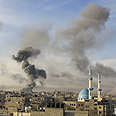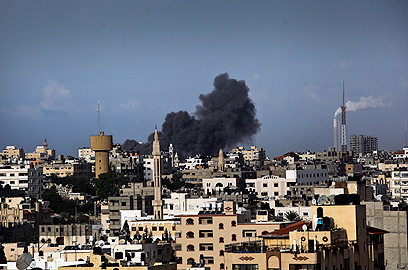
Rights group: Israel violated laws of war in Gaza
Human Rights Watch slams Israel for Pillar of Defense airstrikes lacking 'any apparent military objective'; IDF: Publishing unverified claims 'regrettable'
Human Rights Watch (HWR) said it counted 14 airstrikes in which there didn't appear to be a valid military target, and four others targeting militants, but which used disproportionate force.
Related Stories
- Rights group: Gaza terrorists committed war crimes
- Israel's human rights record 'concerns' UK
- Watch: Soldiers 'punish' Palestinian village
HRW said the attacks killed more than 40 Palestinian civilians. They included a bomb attack on a home in the northern Gaza Strip town of Jebalia that killed Fouad Hijazi, a 46-year-old janitor, and two of his children, ages 4 and 2.
Israel's air assault came after weeks of increased rocket fire by Palestinian militants in Gaza toward Israeli communities.
An Israeli military spokeswoman said the army "established an inquiry board" headed by a major general to look into the eight-day operation, including incidents raised by HRW. She said the board's work hadn't yet been completed.
"It is regrettable that the organization has opted to publish unverified claims," the spokeswoman said. She could not be identified, citing military policy.
Without any apparent military objective
HRW based its report on interviews with residents, who were asked whether there was militant activity nearby attack sites. It also crosschecked the names of slain Palestinians against lists issued by Gaza militant groups to ascertain whether they were civilians. Gaza militant groups tend to announce the deaths of their fighters.
In the past, Israel has blamed Hamas for civilian casualties, saying the group uses schools, mosques and residential areas for cover while carrying out attacks. But cases of mistaken identity or faulty intelligence have also been known to result in civilian casualties.
The HRW report said attacks included bombings of civilian locations like homes and farm groves, "without any apparent military objective."
That included a strike on November 21st that killed a 48-year-old farmer, Talal al-Asaly, and two of his children, Ayman, 19, and Abeer, 11, in northern Gaza while working in their garden.
Another drone strike two days earlier killed Ibrahim al-Astal, 48, and his nephew, Omar al-Astal, 14, in the southern area of Khan Younis.
In each case, residents said they did not observe Palestinian militants trying to fire missiles nearby, the usual target of such Israeli strikes.
The report said other strikes appeared to have military targets but caused disproportionate harm to human life and property.
They cited an attack on November 20th may have targeted the home of a Palestinian militant, killing three civilians and wounding at least 20 others.
Another strike hit the home of a man that Israeli officials identified as a Hamas militant, killing 12 civilians.
The report comes after other criticisms of Israel's conduct during the military operation, including attacks on reporters working for Palestinian news outlets sympathetic to militants.
One attack killed two cameramen, another wounded seven media workers and a third strike on a media office inside a residential building killed a 2-year-old boy.
Human Rights Watch has also criticized Hamas for firing rockets at Israeli civilian areas.
- Receive Ynetnews updates directly to your desktop












